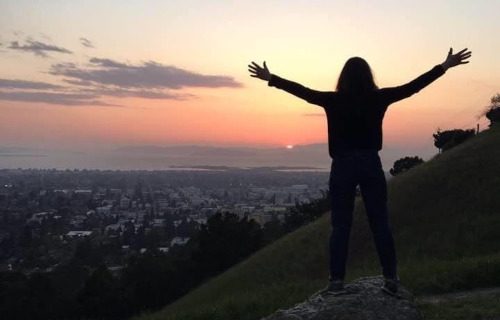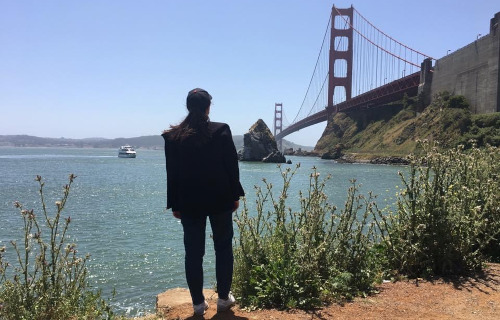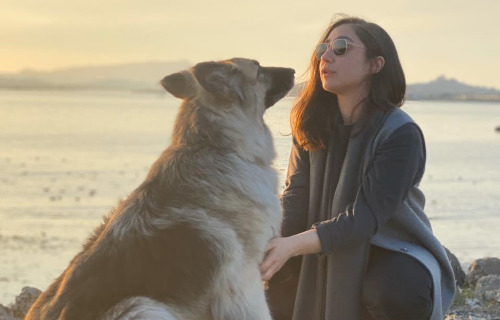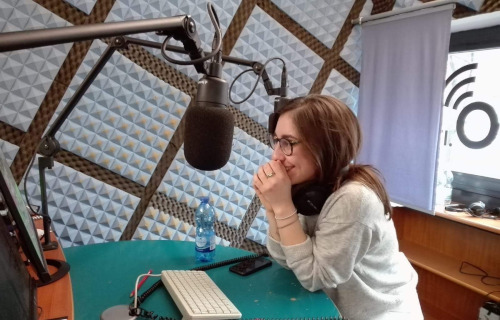07.08.2020 14:30
Giulia Guidi: from the Politecnico di Milano to a PhD at UC Berkeley
Biomedical engineering graduate wins a scholarship to do a PhD in Computer Science
Giulia Guidi, biomedical engineering graduate from the Politecnico di Milano and currently a doctoral candidate at UC Berkeley, has won an ACM SIGHPC Computational and Data Science 2020 scholarship worth $15,000 annually.
The programme aims to enhance the diversity of students in computer science degree courses. The scholarships are highly competitive and are awarded after a rigorous merit assessment. They are awarded by the Special Interest Group on High Performance Computing with ACM, the Association of Computer Machinery.
This is a great recognition for Giulia, who has achieved many important goals despite her young age. We asked her to tell us about them, which follow a trip that takes us from Piazza Leonardo Da Vinci to the Bay Area of San Francisco.
Have you always had clear ideas about your future?
"I wouldn’t say so, no. Since I was little I had always wanted to be a doctor. But when I reached secondary school, I became interested in biomedical engineering, mainly as a plan B in case I didn’t pass the test for medicine. And in hindsight, I can say I was lucky: I immediately fell in love with biomedical engineering and decided I wouldn’t sit the test for medicine again.
"To be honest, during the first two years of studies, I wasn’t entirely sure how I would continue my studies. I am very curious and I didn’t have any reference model, so it wasn’t easy to say what field I would like more: chemistry or materials, mechanical engineering or electronics or computer science. During the third year, I started to concentrate mainly on chemistry, which was always my strength in secondary school, and so it seemed a reasonable choice. During my last semester, though, I fell back on mechanical engineering.
I still hadn’t understood what extraordinary things can happen if you step out of your comfort zone!
How did you learn about the world of computing systems engineering?
"I took my first computer science course when I was already working on my biomedical engineering thesis. This was a revelation for me: no other course had motivated and stimulated me like that one. When the instructor, Marco Santambrogio, suggested that I work with him at NECSTLab, I had no doubts it would be a fantastic experience.
"In September 2015, I proposed a project to accelerate the computation of a protein folding algorithm, the process in which molecules are folded and proteins obtain their three-dimensional structure. He liked it immediately, and so in November I started to work on the ProFAX project with Lorenzo Di Tucci, who was then a Master’s student and now a doctoral student at the Politecnico, as well as co-founder of the start-up Huxelerate.
When I graduated in biomedical engineering in February 2016, it was clear that computer science would be an important part of my future.
So the choice of the Master’s was required…
"In reality, no. The idea of a Master’s in computing systems engineering scared me, and so I applied for the Master’s in biomedical engineering with a specialization in cells and tissues.
Once again I was afraid of stepping out of my comfort zone, with the result that I worked a ton each day to keep track of my two ‘souls’.
"The turn came in 2016. In May I had attended my first NECST Group Conference, an event organized by NECSTLab, in which students are fully immersed in the reality of Silicon Valley and the Bay Area.
"It was an experience at once both marvellous and terrifying. At the time, my English wasn’t very good, if not terrible, so each presentation was like torture; how I would have been proud to present my work!
"Presenting the ProFAX project at UC Berkeley, I got to meet Steven Hofmeyr, staff scientist at Lawrence Berkeley National Lab (LBNL).
A couple of months later, at the end of August … I still remember the message that appeared on my phone: “Hey, would you like to come work for a few months at LBNL?”
That must have been very exciting. How did you feel?
"I couldn’t believe it. My self-esteem has never been particularly high and I had never thought I would be up to such tasks. As the cherry on top, Lorenzo and I also won the Xilinx Open Hardware Contest in the student category that summer with the ProFAX project.
It was an incredible year
“Inspired by ProFAX, Lorenzo came up with a new idea that we worked on the following year — HUGenomics — which then inspired his doctoral thesis and start-up.
How was the beginning at Berkeley?
"In March 2017 I left for California and Lorenzo joined me in April. Initially we were supposed to work on the same project, but I realized that he wouldn’t need my help to complete it, and I didn’t want to waste that incredible opportunity. So I asked Steven if he had other projects available for me. He put me in contact with Aydın Buluç, thanks to whom I entered the area of study where bioinformatics and high-performance computing intersect. That collaboration with Aydin gave rise to my Master’s thesis.
From that moment, that became my main area of research. As much as I like to draw advantage from my biomedical background, it is the high-performance computing part that is really exciting. My goal is to use my passion for HPC to benefit computational science.
How did the idea of applying for the PhD come up?
"At the end of July 2017, I returned to Italy. I had understood that Berkeley was where I wanted to continue to cultivate my new-found passion for computer science.
At that point, I was no longer afraid of getting out there.
"Thanks to Professor Santambrogio, and also Lorenzo, I understood that I could do anything I wanted to with dedication and determination. So I applied for the PhD programme at UC Berkeley in the winter of 2017. In February 2018 I was accepted. In July 2018 I graduated in biomedical engineering and after a few days at the NECST Summer Workshop, I left to begin my doctorate in computer science at UC Berkeley.
What does your research deal with in particular?
"Since 2018 I have been part of different research groups here at UC Berkeley with my advisors Prof. Kathy Yelick and Prof. Aydın Buluç: PASSION Lab, BeBOp Group, and the Performance and Algorithms Research (PAR) Group.
"My main research topic is an algorithm for de novo genome assembly in distributed memory systems, which rely on the enormous computational power of supercomputers. It falls under the Exabiome project, which in turn is part of the Exascala project.
In particular, I like solving this problem, thinking about it as a series of possible algebraic operations.
"In fact, operations on sparse matrices in distributed memory are the main ingredient of my work, with a dose of probability, statistics, and biology. In addition to my main research, I have a series of side projects that I am working on in parallel, which concentrate on different topics such as performance analysis and workload characterization, GPU and SIMD programming, not necessarily tied to bioinformatics.
"My work enabled me to be selected as a participant at the Gene Golub SIAM Summer School on High Performance Data Analytics last summer in the French Alps, which I wrote an article for SIAM News.
What pushed you to apply for the SIGHPC Fellowship?
"I would like to answer simply by citing a passage from the motivational letter I attached to the application:
As a graduate in biomedical engineering, I noted that competencies in different sectors are fundamental for developing solutions that may impact people’s lives. This is why I decided to obtain a PhD in computer science. Interdisciplinary research in HPC and bioinformatics is difficult, but exciting. My aspiration is to face new computational challenges to normalize the efficient processing of the growing amount of genomic data in bioinformatics research and accelerate the time to impact people’s lives.
What are your future projects?
"After the doctorate, in 2–3 years — here in the United States PhD courses last an average of 5–6 years because they entail many courses, both to take and to teach, since it is not based exclusively on research — I still don’t know if I will return to Europe or stay in the States.
I know that I would like to continue to do research and teach, in the hopes of having a positive impact on my students and collaborators, just like my professors Santambrogio, Buluç, and Yelick have had on me.
"To do my part, last winter I was mentor for the Lead the Future association, where I helped Italian students prepare their PhD applications in the United States: an experience that I would like to repeat next winter. In the meantime, I am committed to being a mentor for summer students, both at UC Berkeley and at Lawrence Berkeley National Lab (LBNL), as well as spending part of the academic year as a teaching assistant. From this year, I am part of the EECS Peers group, through which I offer academic and personal assistance to students who need it."





